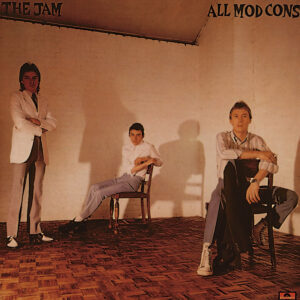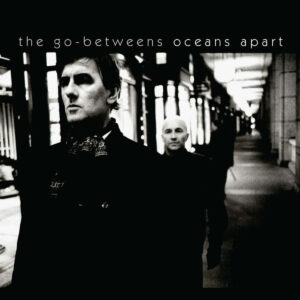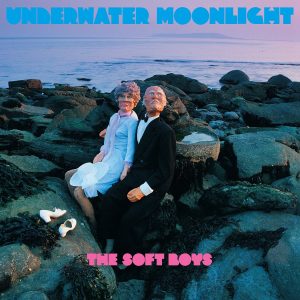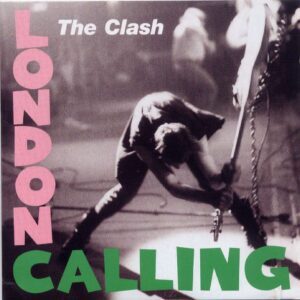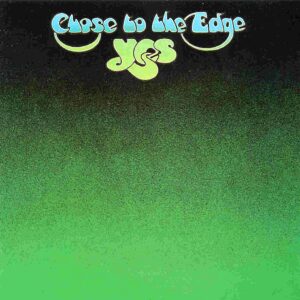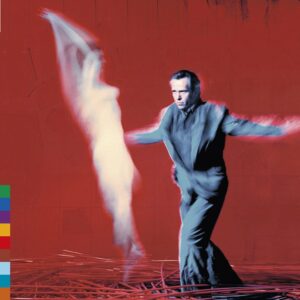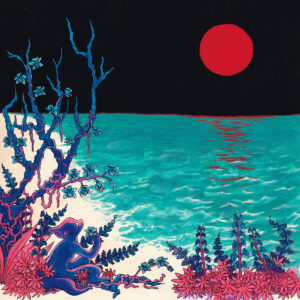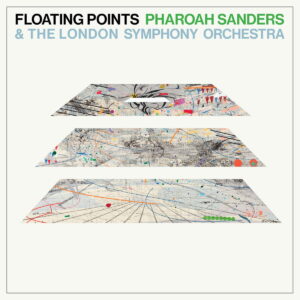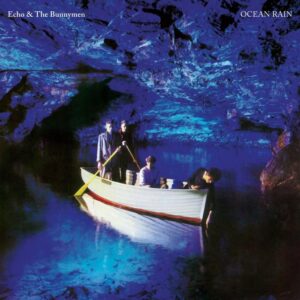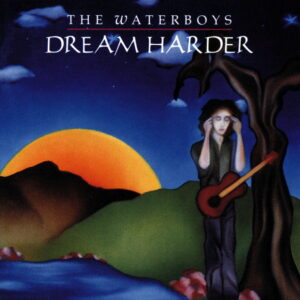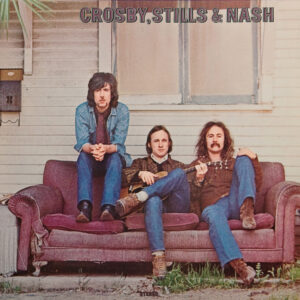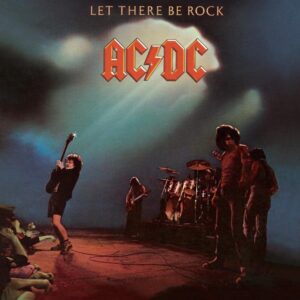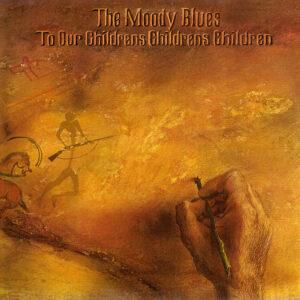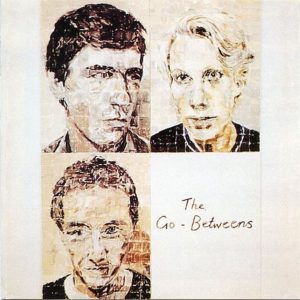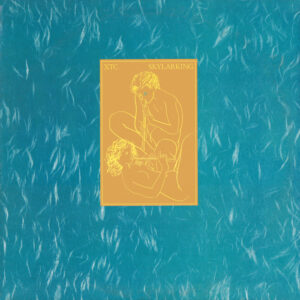
The members of The dB’s are all from Winston-Salem, North Carolina, also the birthplace of Mitch Easter (Let’s Active) and Ben Folds. As teens, future dB’s Chris Stamey and Peter Holsapple joined Easter in a band named Rittenhouse Square, playing Wishbone Ash covers and recording a six-song album. Holsapple also spent a year in prep school in New Hampshire where he played with future Tom Petty sideman Benmont Tench.
Chris Stamey planned to attend New York University but found himself playing bass for Alex Chilton. He joined forces with the rhythm section of drummer Will Rigby and bassist Gene Holder. The first song credited to The dB’s was 1977′ ‘(I Thought) You Wanted To Know’, billed as Chris Stamey and the dB’s; Television’s Richard Lloyd played guitar. Peter Holsapple joined the band in 1978, sharing frontman duties with Stamey.
The dB’s never broke through to the mainstream – the only exception was their debut album Stands for Decibels charting in Sweden. But they were an accomplished early college-rock band. They mixed disparate ideas – 1960s psychedelia, the power-pop of Big Star, and the new wave of Elvis Costello – into their sound.
Stamey left after 1982’s Repercussion, leaving the band as a three-piece. The band broke up in the late 1980s, although Stamey and Holsapple released the duo album Mavericks in 1991. Holsapple later served as a touring member of R.E.M. and Hootie and the Blowfish. The dB’s reunited in the 21st century and recorded an impressive comeback album. I’ve covered all five of The dB’s’ studio albums and a couple of extra-curricular records, but haven’t tackled Stamey’s solo career. He’s recorded eleven albums to date, including the fabulously titled The Robust Beauty of Improper Linear Models in Decision Making.
The dB’s Album Reviews
Stands for Decibels | Repercussion | Like This | The Sound of Music | Falling Off The Sky
Stands for Decibels
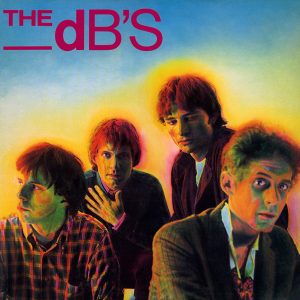
1981, 8.5/10
After a series of early demos and singles, released in 2021 as I Thought You Wanted to Know: 1978-1981, The dB’s arrived fully-formed on their debut album. The production from Alan Betrock isn’t as muscular as on their second record, but Holsapple and Stamey already have their complementary styles figured out. The rhythm section is sharp, with Rigby’s virtuoso drumming and Holder’s energetic bass.
As always, Holsapple provides the more traditional and straightforward songs – opener ‘Black and White’ is terrific power-pop, while the classic ‘Big Brown Eyes’ is buried deep in the second side. The calmer ‘Moving In Your Sleep’ works well as a closer. Stamey’s material is nervier and more idiosyncratic; ‘She’s Not Worried’ could have come from a 1960s Move album, while ‘Tearjerkin” restlessly shifts gears – with its Farfisa organ, it’s closer to new wave. ‘Dynamite’ is a group composition, while ‘Judy’ is a catchy non-album single from Holsapple that’s included on reissues.
The dB’s peaked early – essentially, it’s a choice between their first two records for the title of best dB’s album.
Repercussion
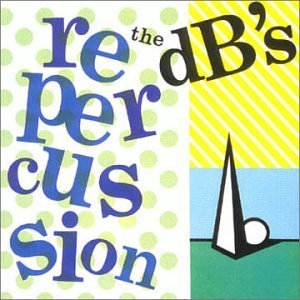
1982, 9/10
Repercussion is a great title for a sophomore album – I’m surprised it took until 1982 for a band to use it (not counting M’Boom’s 1973 album Re: Percussion). Repercussion was the first album produced by Scott Litt, who’d later work with Nirvana and R.E.M. – he helps provide the band with a bigger sound. It’s a more confident album – Stamey’s tunes are more accessible than on the debut, and the first side is particularly impressive.
The Rumour Brass play on the opening track ‘Living a Lie’ – the horns work well with the group’s offbeat pop. Stamey’s ‘Ask For Jill’ has one of the most memorable spoken interludes in popular music: “Well look, let’s not beat around the bush/Oh, really? Yeah, I’ll hold.” Holsapple’s ‘Amplifier’ is a textbook example of juxtaposing upbeat music with tragic lyrics.
Repercussion was the last dB’s album for three decades to feature the original lineup – Stamey left the band in April 1982.
Two amazing albums, Stands For Decibels and Repercussion, by the original lineup, were records later revered by some as much as the Big Star stuff. Why the breakup?
Peter Holsapple, https://magnetmagazine.com/2009/06/01/qa-with-peter-holsapple-chris-stamey/
We didn’t really break up. Chris left the band because he wanted to do stuff that was more experimental. He took a lot of composition courses under a guy named Roger Hannay at UNC. Chris is more of a schooled musician than I am. I could be wrong, but maybe it got a little boring for him when my songs ended up being the a-sides of the singles. He parted company with us, not anything angry. He wanted to move on. And we were still enjoying playing with each other a lot. Chris was looking for something new and interesting to do, and I think he felt we’d mined the two guitars, bass and drums stuff as far as it would go. But now we’re back together as the dB’s with the original members, and we’re working on a new record.
Like This
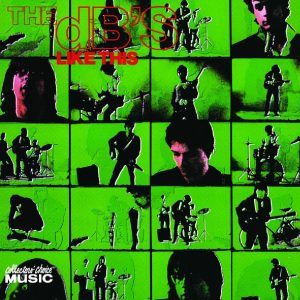
1984, 7.5/10
The dB’s’ third album was recorded as a three-piece. Even though Holsapple is my favourite of the band’s writers, Stamey was a great foil for him, providing contrast to his more conventional writing. Without Stamey the band are inevitably less exciting and more predictable. Holsapple provides a strong batch of songs, however, and dabbles into other styles to give Like This some needed diversity – ‘A Spy in the House of Love’ is almost danceable, while ‘White Train’ ventures into country territory. The muscular production from The Waitresses’ Chris Butler is an asset.
Curiously, ‘Amplifier’ is reprised from the previous record, in a remixed version. The power-pop of ‘Love is for Lovers’ and the funky ‘A Spy in the House of Love’ are as radio-friendly as anything in the dB’s’ catalogue. It’s easy to forget the band’s southern roots on their early records, but ‘White Train’ is almost straight country. There are enjoyable and tuneful deep cuts like ‘Lonely Is (As Lonely Does)’ and ‘Darby Hall’.
The dB’s are less dynamic without Chris Stamey, but Like This is a valiant effort from Holsapple.
The Sound of Music
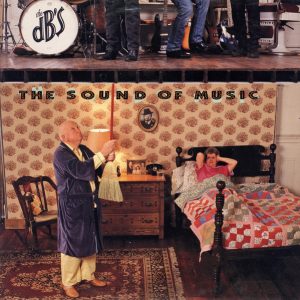
1987, 7/10
The dB’s took a forced two-year hiatus after Like This – they were stuck in limbo after their label, Bearsville, run by Albert Grossman, folded. When freed from their contract, R.E.M.’s Peter Buck arranged for them to sign with IRS. During the interim, Rigby and Holder, worked for an art gallery doing installations in New York City. The band became a four-piece again with Holder moving to guitar, hiring new bassist Jeff Beninato. As with Like This, The Sound of Music is another valiant effort from Holsapple to keep The dB’s running without Stamey.
While The Sound of Music is another step-down, there are still good tracks. ‘Change With The Changing Times’ is snappy power pop, and Holsapple’s voice athletically wraps its way around the high notes on ‘A Better Place’. Then introspective rocker ‘I Lie’ is an odd choice for the first single – 1987 saw college-rock contemporaries like R.E.M. and 10,000 Maniacs hit the mainstream, but it wasn’t the right time for the dB’s with their weakest album to date. It leans more heavily into country music, which sometimes makes it seem insincere, especially when one of the most memorable songs is the light-hearted ‘Bonneville’.
Gene Holder left the band as The Sound of Music was released, joining his girlfriend in The Wygals. The band recorded demos for a fifth album, later bootlegged as Paris Avenue. They broke up in 1988 after Rigby quit the band due to impending fatherhood, and didn’t reform until the 21st century.
Mavericks – Peter Holsapple and Chris Stamey
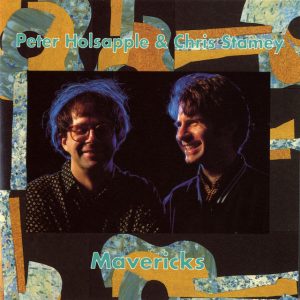
1991, 8/10
The dB’s split up in the late 1980s, and Holsapple moved on to work with R.E.M. and the Continental Drifters. But Stamey and Holsapple had been friends since elementary school and reconvened to make an album as a duo. It’s largely stripped down and acoustic, with the duo’s harmonies at the centre. Neither Stamey nor Holsapple are top-rate individual vocalists, but their voices blend beautifully on Mavericks. Holsapple later told Magnet Magazine that “we tried to make things happen musically and sonically that were reasonable facsimiles of what adult dB’s would do”.
There’s a pretty cover of Gene Clark’s Byrds song ‘Here Without You’, while the rest of the songs are split between Stamey and Holsapple. They wrote the opener ‘Angel’ together, and it’s the standout track with a pretty tune and harmonies. It’s fun hearing the dB’s nervy new wave translated to a low key setting – ‘I Know You Will’ has a twitchy rhythm guitar part that’s asking for a busier arrangement, but it’s still propulsive here. Stamey’s ‘I Want to Break Your Heart’ is given a tougher arrangement, and it’s close to power-pop, especially with the duo’s lovely harmonies.
Mavericks is a strong comeback from Holsapple and Stamey, a mature and nuanced sequel to Repercussion. The duo later released Here and Now in 2009, as well as an album of dB’s reworkings, Our Back Pages, in 2021.
Paris Avenue
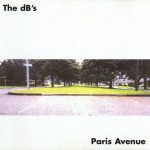
1994. not rated
Paris Avenue is a bootleg recorded in the late 1980s of songs for a fifth dB’s album. The album was scrapped – I’ve never heard it, but it’s not well-regarded by fans. There are some great song titles, including ‘Why Did You Sleep with My Girlfriend?’ and ‘Bald Headed Baby’. Gene Holder was gone from the band at this point – Jeff Beninato is the bassist.
Falling Off The Sky
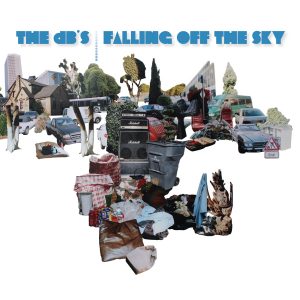
2012, 8/10
The original lineup of The dB’s reunited in 2005, playing live together. Falling Off The Sky finds the original lineup back in the studio together for a full album for the first time since 1982’s Repercussion. Understandably, it’s a little less perky than the last time Stamey was in the dB’s – there’s less jerky new wave, instead focusing on well-written, harmonised power-pop.
Will Rigby gets his first sole writing credit and lead vocal on a dB’s record – he’s archly clever on ‘Write Back’ (“When I didn’t reply to your reply/To my reply to your reply to my reply/To your reply to my letter”). As usual, Holsapple supplies the most immediate material like ‘That Time Is Gone’ and ‘Send Me Something Real’. Less typical is ‘She Won’t Drive In The Rain Anymore’ – it’s heartfelt and mature, and it’s a contender for the best thing Holsapple has ever written. Stamey’s mining the 1960s for inspiration – ‘The Adventures Of Albatross and Doggerel’ is a dreamy psychedelic rocker with its references to the looking glass and trippy orchestral instruments.
Falling Off The Sky is a very credible comeback album – it’s The dB’s’ best record since 1982.
Out Of My Way – Peter Holsapple
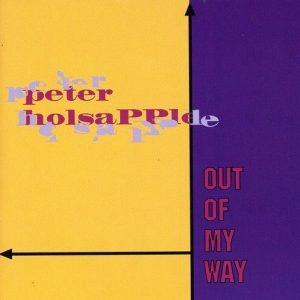
1997, 7/10
Peter Holsapple has recorded two studio albums to date – his solo debut Out Of My Way appeared in 1997, in between Holsapple’s stints with Hootie and the Blowfish and The Continental Drifters. It’s much more rootsy than Holsapple’s other work – while the later 1980s dB’s records flirted with country, Out of My Way is closer to gritty Americana. It emphasises a raw, rootsy side to Holsapple’s music – his voice creaks, and the arrangements are raw. Guests include Benmont Tench, who played in a prep school band with Holsapple back in the 1970s, and fellow Continental Drifters Vicki Peterson and Susan Cowsill (married to Holsapple at the time).
Out Of My Way has its merits- it presents an unvarnished take on Holsapple’s sound. But at the same time, it largely negates Holsapple’s biggest strengths – his hook craft and tunes. The most memorable songs are the sprightly pop/rock of ‘I Been There’, ‘Meet Me In The Middle’, and ‘Away With Love’ with a great bassline. But it’s the grittier material that makes the biggest impression, different from Holsapple’s usual material, like the acoustic ‘I Am A Tree’. ‘Couldn’t Stop Lying To You’ is almost a torch song, with a surprisingly effective Holsapple vocal.
Out Of My Way isn’t my favourite Holsapple project but it’s interesting to hear him explore musical territory outside his usual zone.
10 Best dB’s Songs
Amplifier
Big Brown Eyes
Happenstance
She Won’t Drive in the Rain Anymore
Black and White
Ask For Jill
Love Is For Lovers
Tearjerkin’
Living A Lie
The Adventures of Albatross and Doggerel
Back to Punk and New Wave Album Reviews…
Related Pages
About
Aphoristic Album Reviews is almost entirely written by one person. It features album reviews and blog posts across a growing spectrum of popular music.
Review Pages
Read about the discographies of musical acts from the 1960s to the present day. Browse this site's review archives or enjoy these random selections:
Blog Posts
I add new blog posts to this website every week. Browse the archives or enjoy these random selections:

